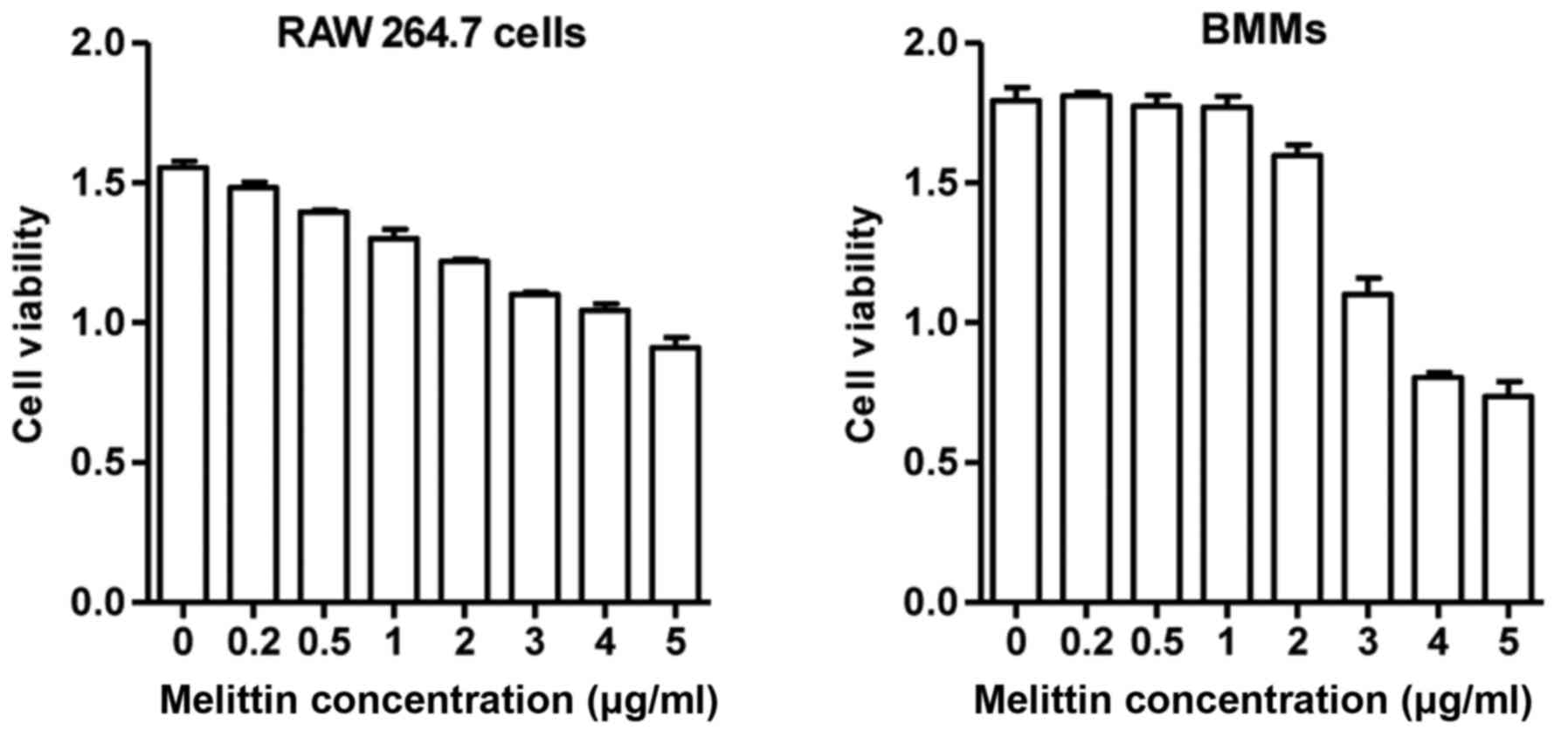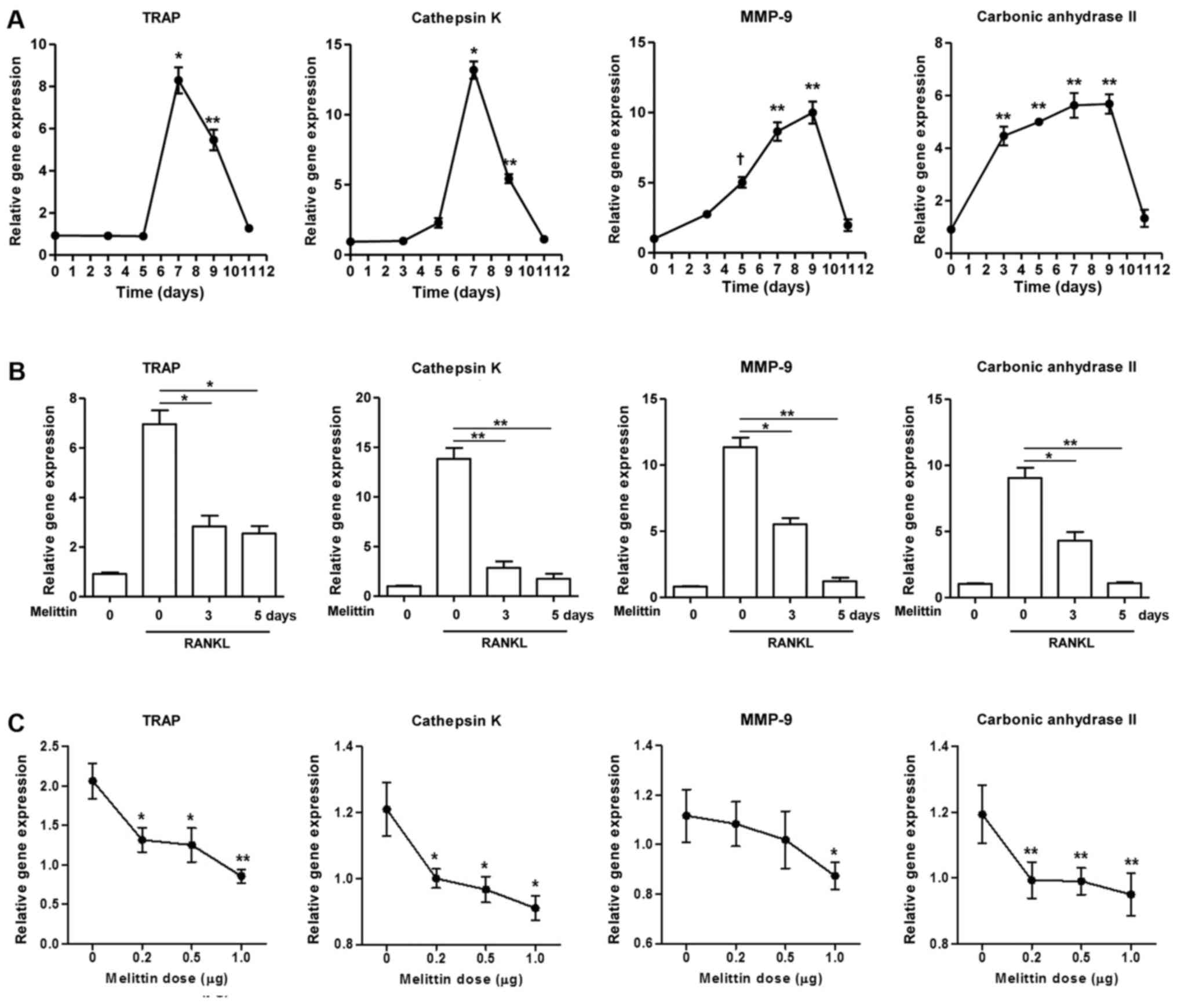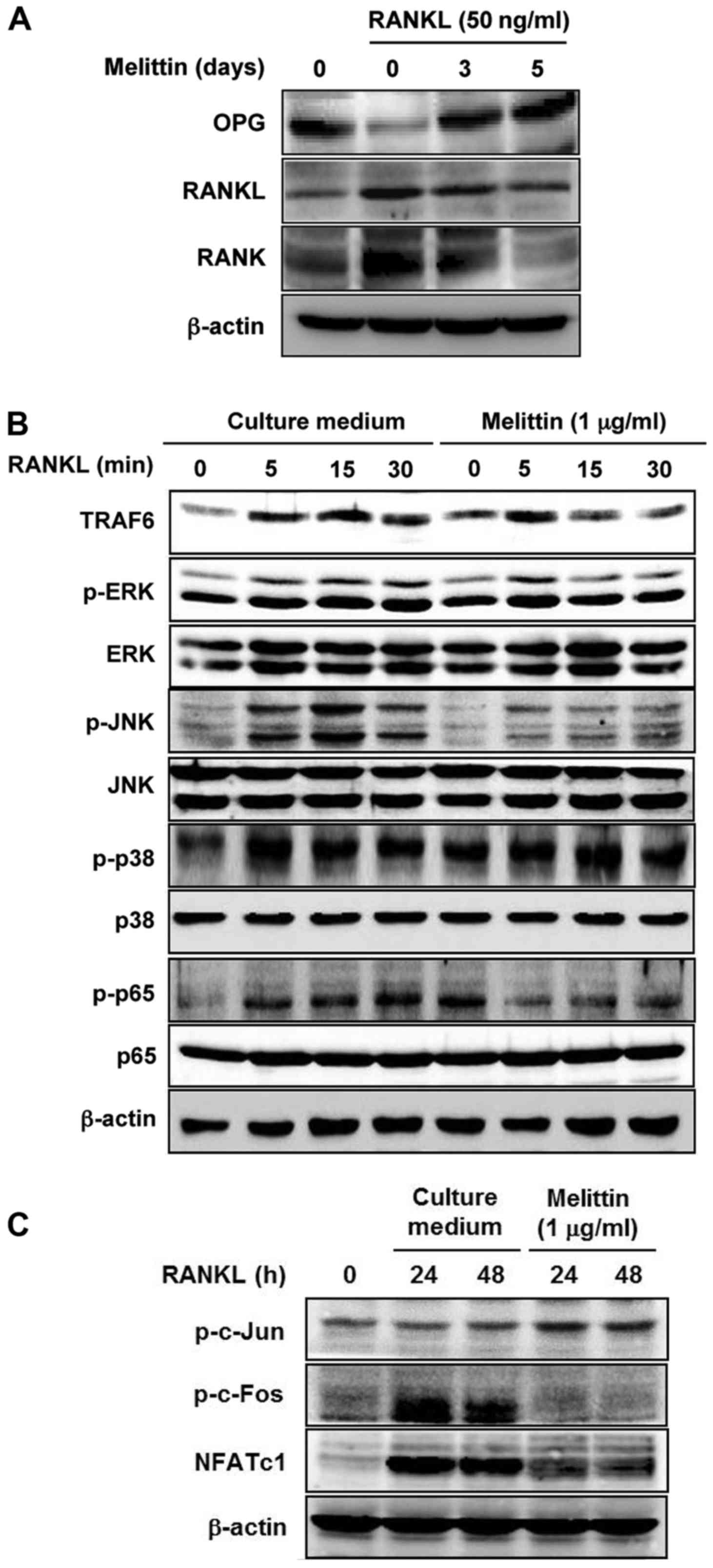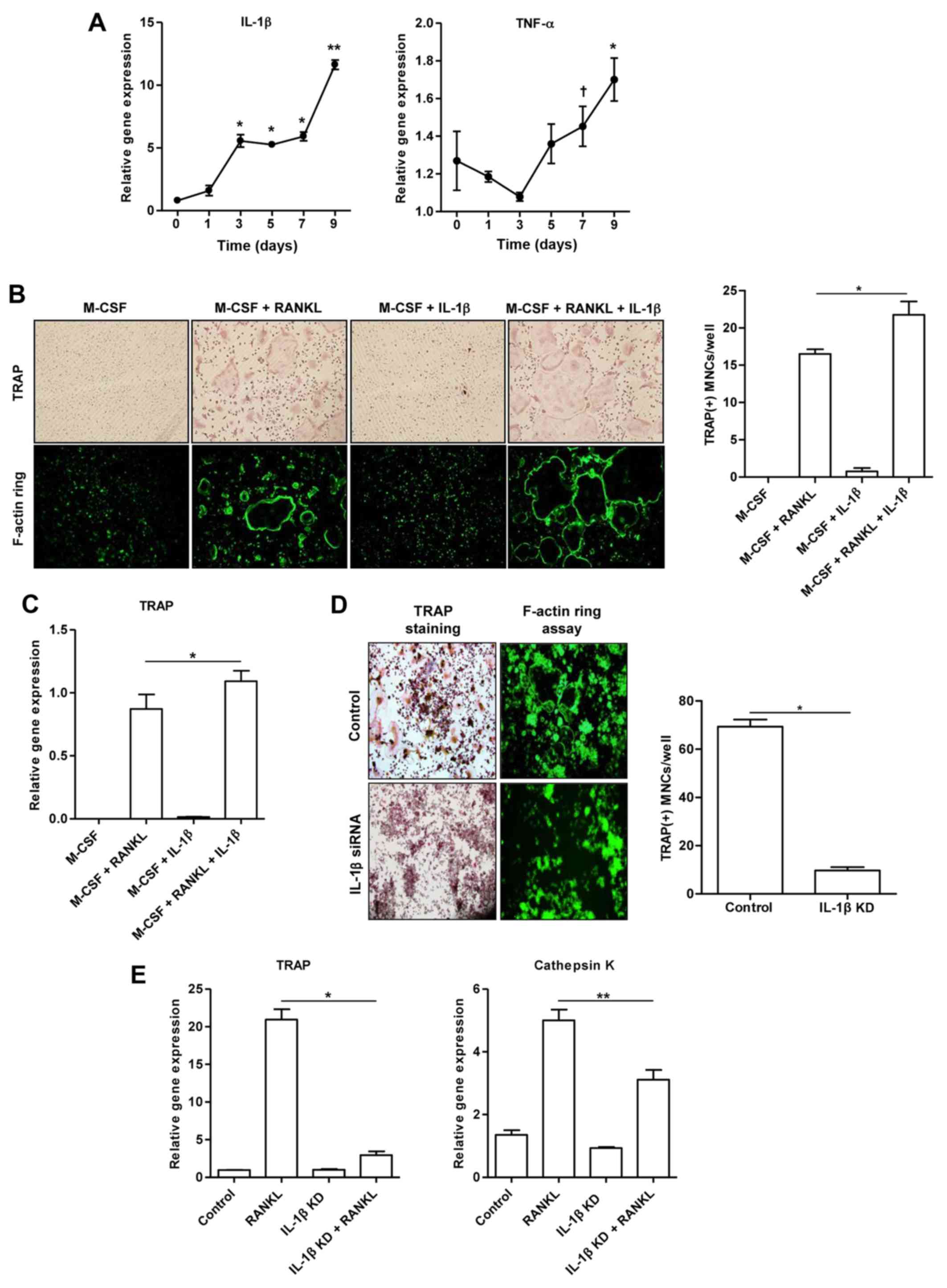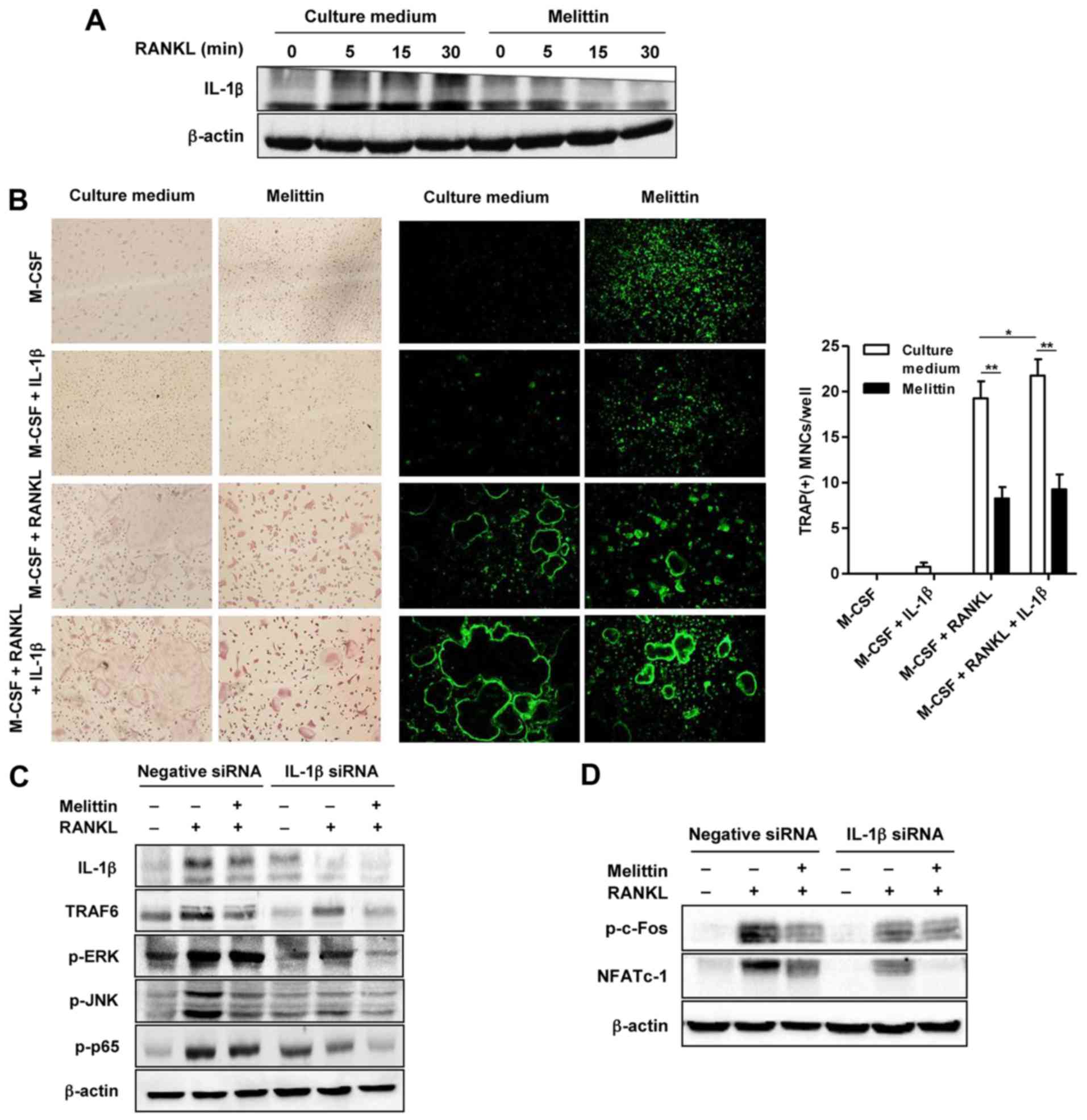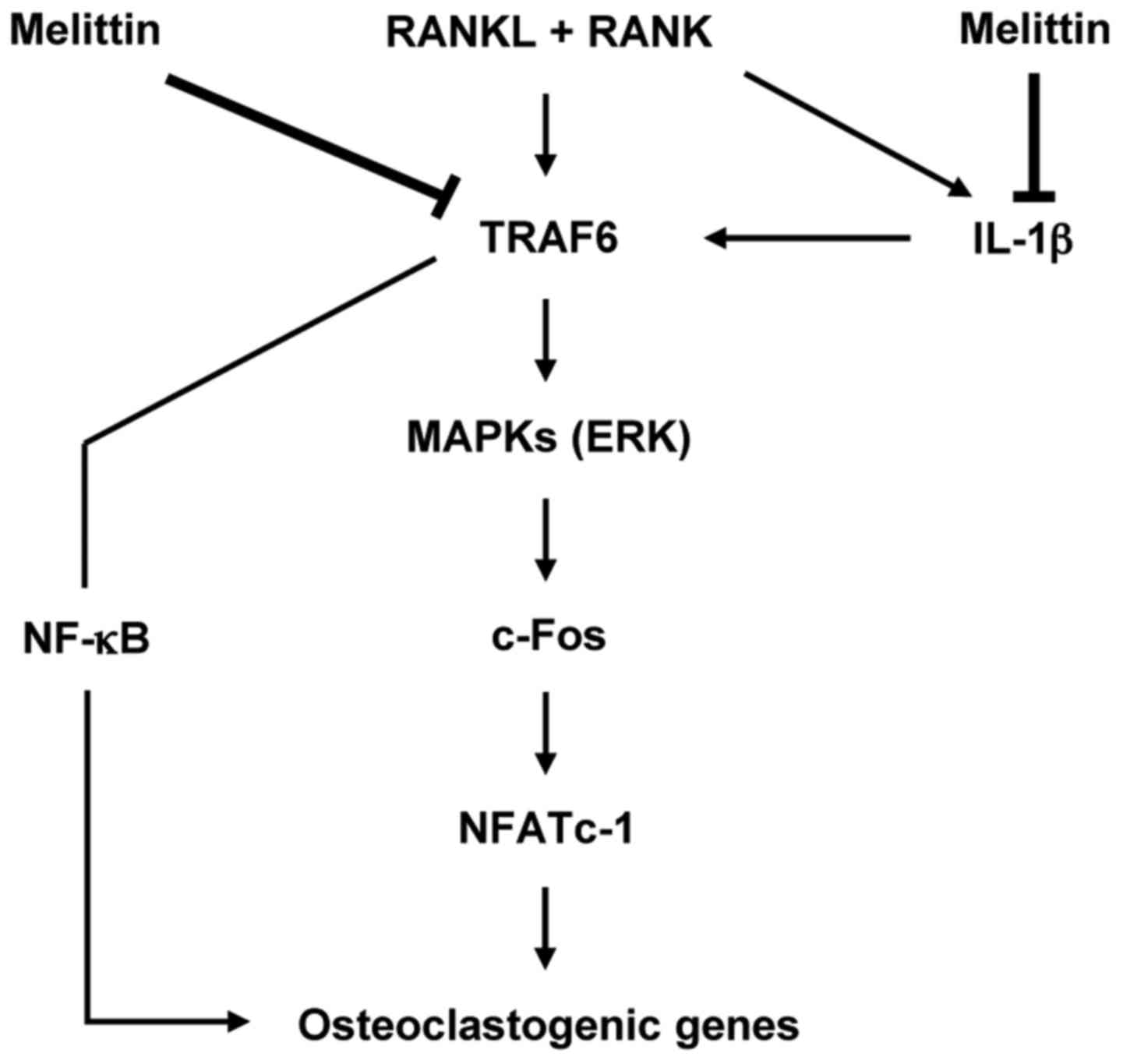|
1
|
Takayanagi H: Osteoimmunology: Shared
mechanisms and crosstalk between the immune and bone systems. Nat
Rev Immunol. 7:292–304. 2007. View
Article : Google Scholar : PubMed/NCBI
|
|
2
|
Asagiri M and Takayanagi H: The molecular
understanding of osteoclast differentiation. Bone. 40:251–264.
2007. View Article : Google Scholar
|
|
3
|
Teitelbaum SL: Osteoclasts; culprits in
inflammatory osteolysis. Arthritis Res Ther. 8:2012006. View Article : Google Scholar :
|
|
4
|
Udagawa N, Kotake S, Kamatani N, Takahashi
N and Suda T: The molecular mechanism of osteoclastogenesis in
rheumatoid arthritis. Arthritis Res. 4:281–289. 2002. View Article : Google Scholar : PubMed/NCBI
|
|
5
|
Colucci S, Brunetti G, Cantatore FP,
Oranger A, Mori G, Quarta L, Cirulli N, Mancini L, Corrado A,
Grassi FR and Grano M: Lymphocytes and synovial fluid fibroblasts
support osteoclastogenesis through RANKL, TNFα, and IL-7 in an in
vitro model derived from human psoriatic arthritis. J Pathol.
212:47–55. 2007. View Article : Google Scholar : PubMed/NCBI
|
|
6
|
Dalbeth N, Smith T, Nicolson B, Clark B,
Callon K, Naot D, Haskard DO, McQueen FM, Reid IR and Cornish J:
Enhanced osteoclastogenesis in patients with tophaceous gout: Urate
crystals promote osteoclast development through interactions with
stromal cells. Arthritis Rheum (Munch). 58:1854–1865. 2008.
View Article : Google Scholar
|
|
7
|
Lee SJ, Nam KI, Jin HM, Cho YN, Lee SE,
Kim TJ, Lee SS, Kee SJ, Lee KB, Kim N and Park YW: Bone destruction
by receptor activator of nuclear factor κB ligand-expressing T
cells in chronic gouty arthritis. Arthritis Res Ther. 13:R1642011.
View Article : Google Scholar
|
|
8
|
Gowen M, Wood DD, Ihrie EJ, Meats JE and
Russell RG: Stimulation by human interleukin 1 of cartilage
breakdown and production of collagenase and proteoglycanase by
human chondrocytes but not by human osteoblasts in vitro. BBA.
797:186–193. 1984.PubMed/NCBI
|
|
9
|
Kim JH, Jin HM, Kim K, Song I, Youn BU,
Matsuo K and Kim N: The mechanism of osteoclast differentiation
induced by IL-1. J Immunol. 183:1862–1870. 2009. View Article : Google Scholar : PubMed/NCBI
|
|
10
|
Wei S, Kitaura H, Zhou P, Ross FP and
Teitelbaum SL: IL-1 mediates TNF-induced osteoclastogenesis. J Clin
Invest. 115:282–290. 2005. View Article : Google Scholar : PubMed/NCBI
|
|
11
|
Strand V and Kavanaugh AF: The role of
interleukin-1 in bone resorption in rheumatoid arthritis.
Rheumatology (Oxford). 43(Suppl 3): iii10–iii16. 2004. View Article : Google Scholar
|
|
12
|
Billingham ME, Morley J, Hanson JM,
Shipolini RA and Vernon CA: Letter: An anti-inflammatory peptide
from bee venom. Nat Lett. 245:163–164. 1973. View Article : Google Scholar
|
|
13
|
Kwon YB, Lee HJ, Han HJ, Mar WC, Kang SK,
Yoon OB, Beitz AJ and Lee JH: The water-soluble fraction of bee
venom produces antinociceptive and anti-inflammatory effects on
rheumatoid arthritis in rats. Life Sci. 71:191–204. 2002.
View Article : Google Scholar : PubMed/NCBI
|
|
14
|
Park HJ, Lee SH, Son DJ, Oh KW, Kim KH,
Song HS, Kim GJ, Oh GT, Yoon DY and Hong JT: Antiarthritic effect
of bee venom: Inhibition of inflammation mediator generation by
suppression of NF-κB through interaction with the p50 subunit.
Arthritis Rheum (Munch). 35:3504–3515. 2004. View Article : Google Scholar
|
|
15
|
Terwilliger JT and Eisenberg D: The
structure of melittin. II. Interpretation of the structure. J Biol
Chem. 257:6016–6022. 1982.PubMed/NCBI
|
|
16
|
Kim SK, Park KY, Yoon WC, Park SH, Park
KK, Yoo DH and Choe JY: Melittin enhances apoptosis through
suppression of IL-6/sIL-6R complex-induced NF-κB and STAT3
activation and Bcl-2 expression for human fibroblast-like
synoviocytes in rheumatoid arthritis. Joint Bone Spine. 78:471–477.
2011. View Article : Google Scholar : PubMed/NCBI
|
|
17
|
Tashjian AH Jr, Ivey JL, Delclos B and
Levine L: Stimulation of prostaglandin production in bone by
phorbol diesters and melittin. Prostaglandins. 16:221–232. 1978.
View Article : Google Scholar : PubMed/NCBI
|
|
18
|
Park H, Jung YK, Park OJ, Lee YJ, Choi JY
and Choi Y: Interaction of Fas ligand and Fas expressed on
osteoclast precursors increases osteoclastogenesis. J Immunol.
175:7193–7201. 2005. View Article : Google Scholar : PubMed/NCBI
|
|
19
|
Lee JD, Kim SY, Kim TW, Lee SH, Yang HI,
Lee DI and Lee YH: Anti-inflammatory effect of bee venom on type II
collagen-induced arthritis. Am J Chin Med. 32:361–367. 2004.
View Article : Google Scholar : PubMed/NCBI
|
|
20
|
Naito A, Azuma S, Tanaka S, Miyazaki T,
Takaki S, Takatsu K, Nakao K, Nakamura K, Katsuki M, Yamamoto T and
Inoue J: Severe osteopetrosis, defective interleukin-1 signalling
and lymph node organogenesis in TRAF6-deficient mice. Genes Cells.
4:353–362. 1999. View Article : Google Scholar : PubMed/NCBI
|
|
21
|
Wei S, Teitelbaum SL, Wang MW and Ross FP:
Receptor activator of nuclear factor-κB ligand activates nuclear
factor-κB in osteoclast precursors. Endocrinology. 142:1290–1295.
2001.PubMed/NCBI
|
|
22
|
Miyazaki T, Katagiri H, Kanegae Y,
Takayanagi H, Sawada Y, Yamamoto A, Pando MP, Asano T, Verma IM,
Oda H, et al: Reciprocal role of ERK and NF-κB pathways in survival
and activation of osteoclasts. J Cell Biol. 148:333–342. 2000.
View Article : Google Scholar : PubMed/NCBI
|
|
23
|
David JP, Sabapathy K, Hoffmann O,
Idarraga MH and Wagner EF: JNK1 modulates osteoclastogenesis
through both c-Jun phosphorylation-dependent and -independent
mechanisms. J Cell Sci. 115:4317–4325. 2002. View Article : Google Scholar : PubMed/NCBI
|
|
24
|
Lee WR, Kim KH, An HJ, Kim JY, Chang YC,
Chung H, Park YY, Lee ML and Park KK: The protective effects of
melittin on Propionibacterium acnes-induced inflammatory responses
in vitro and in vivo. J Invest Dermatol. 134:1922–1930. 2014.
View Article : Google Scholar : PubMed/NCBI
|
|
25
|
Jimi E, Akiyama S, Tsurukai T, Okahashi N,
Kobayashi K, Udagawa N, Nishihara T, Takahashi N and Suda T:
Osteoclast differentiation factor acts as a multifunctional
regulator in murine osteoclast differentiation and function. J
Immunol. 163:434–442. 1999.PubMed/NCBI
|
|
26
|
Tanabe N, Maeno M, Suzuki N, Fujisaki K,
Tanaka H, Ogiso B and Ito K: IL-1a stimulates the formation of
osteoclast-like cells by increasing M-CSF and PGE2
production and decreasing OPG production by osteoblasts. Life Sci.
77:615–626. 2005. View Article : Google Scholar : PubMed/NCBI
|
|
27
|
Stuhlmeier KM: Apis mellifera venom and
melittin block neither NF-κB-50-DNA interactions nor the activation
of NF-κB, instead they activate the transcription of
proinflammatory genes and the release of reactive oxygen
intermediates. J Immunol. 179:655–664. 2007. View Article : Google Scholar : PubMed/NCBI
|















